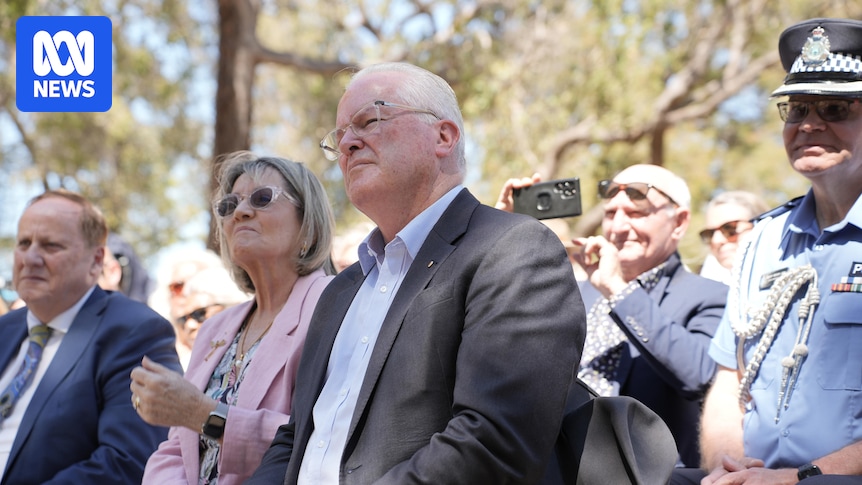Gathering on sacred land where their ancestors were slain in one of the most brutal attacks on Aboriginal people in Western Australia, Traditional Owners heard the word it took almost 200 years to say — “sorry”.
WARNING: This story contains details some readers may find distressing.
It was a word said, then repeated several times, by WA Governor Chris Dawson, apologising for the sins of his 19th-century predecessor Captain James Stirling who orchestrated the violent attacks now known as the Pinjarra Massacre.
Around 200 people were welcomed on Bindjareb country in Pinjarra for the historic apology delivered by the WA governor. (ABC News: Lauren Smith)
In October 1834, scores of Bindjareb Noongar women, men and children were shot and killed by white settlers in an ambush on the banks of the Murray River, 80 kilometres south of Perth.
It was at that same spot on Tuesday morning where elders, local families and school students met to mark yet another anniversary of the massacre.
People who attended the apology said the day brought relief. (ABC News: Lauren Smith)
But the historic apology delivered in this commemoration could potentially change how one of the darkest days in the state’s history will be remembered into the future.
‘Still trying to process it’
For some of the descendants, hearing a government official say “sorry” for the slaughtering of their relatives was extremely significant.
Tears were shed by some of those in attendance and, as Bindjareb woman Karrie-Anne Kearing described, it was difficult to put her emotions into words.
A plaque commemorating lives taken in the Pinjarra Massacre at the spot where the attack took place. (ABC News: Lauren Smith)
“It’s so significant that, you know, I’m still trying to process it,” she said.
Ms Kearing said the fight to have the truth acknowledged had been tough.
Governor Dawson embraces Bindjareb woman Karrie-Anne Kearing, who says the apology would take time to process. (ABC News: Lauren Smith)
“My aunties and my father fought … just to be recognised and for the governor to come down and actually do it is a big step for us as a community,” she said.
“Saying sorry is never easy.
“But it is growth and any growth has some [discomfort] and pain associated with it.”
‘The time is right’: Governor
Addressing more than one hundred people at Tuesday’s memorial ceremony Governor Dawson apologised for the “dreadful wrongs” Captain Stirling committed.
Governor Dawson is hopeful for healing and growth following the apology. (ABC News: Lauren Smith)
“As Governor of Western Australia, I come to you today to say I am deeply sorry for the actions of my predecessor and for the pain and suffering he caused,” he said.
“I say sorry to the Bindjareb people who still feel the trauma of the punishment inflicted on their ancestors that day when so many innocent lives were taken.
“The time has come — and the time is right — for the governor to acknowledge the truth of the past actions of a predecessor.
“I have a deep hope and faith that a process of healing and growth will follow.
“I believe this action will be a significant step along the pathway to meaningful reconciliation.”
Traditional Owners like Gloria Kearing have waited years to hear a government official recognise the wrongs of the past. (ABC News: Lauren Smith)
Mixed emotions were evident in the crowd as the governor spoke.
People were seen wiping their tears as the apology was delivered while others hung their heads with their eyes closed.
Those who gathered stood and cheered as the governor and Ms Kearing embraced.
What happened in PinjarraWA governor to apologise for Pinjarra Massacre
Some of the details of the attack have been contested, like the exact number of Bindjareb Noongar people murdered in the massacre.
A Murdoch University thesis published in 2022 found there was little consensus between the recorded colonial history and oral history from Indigenous people, who had inhabited the land for more than 40,000 years.
“A death count of at least 15 Indigenous men by Captain James Stirling’s reckoning has been contradicted in alternative witness accounts, with subsequent reports indicating a death toll of as many as 80 men, women, and children,” the paper read.
WA Governor Chris Dawson said he pored over handwritten records archived in the State Library, seen by the ABC, to try to understand the truth of what took place at the Pinjarra Massacre. (ABC News: Lauren Smith)
Governor Dawson said he pored over handwritten records archived in the State Library, seen by the ABC, to try to understand the truth of what took place.
“Men, women and children were surrounded and overpowered in a riverbed,” he told the commemoration.
Governor Dawson viewed the Governor’s Dispatch book as part of his research.
For decades, the massacre was referred to as a “battle”, with Governor Stirling journalling it as a “skirmish”.
Standing by the Murray River on Tuesday, Governor Dawson said it was an intentional decision to “punish” Aboriginal people for British settler grievances over land and food.
Archival maps show where the massacre took place. (ABC News: Lauren Smith)
“Governor Sterling came to this place in 1934 with an intent to punish the Bindjareb Noongar people,” he said.
“I come here on the invitation of the Bindjareb Noongar people.
“I come here on foot, unarmed, to walk softly on this country. I come with my heart, my koort, to say sorry.”
About 100 people gathered at the site of the Pinjarra Massacre to hear the historic apology. (ABC News: Lauren Smith)
While Ms Kearing said today’s apology was a big step in moving forward, the fight was still not over.
She said she hoped people would not continue to praise those who had committed such terrible acts.
“People like that shouldn’t be held up in regard for stuff they did back then,” she said.
Loading

